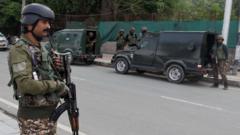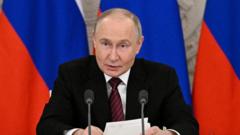The conflict between India and Pakistan appears to have calmed for now, but the underlying tensions and new military capabilities suggest that further confrontations could be imminent.
**Escalating Tensions: India-Pakistan Conflict at a Critical Juncture**

**Escalating Tensions: India-Pakistan Conflict at a Critical Juncture**
The recent flare-up between nuclear-armed neighbors has raised concerns about future hostilities amid advances in military technology.
In the aftermath of a harrowing four-day aerial clash, India and Pakistan have seemingly stepped back from direct conflict, yet a multitude of factors continues to stoke tensions. The use of cutting-edge military technology ushered in an unprecedented level of engagement, with both nations employing mass airstrikes and drone warfare for the first time along the contentious Line of Control in Kashmir. This surge in military activity brought missiles and drones crashing into both territories, striking vital installations and escalating the risk of a larger confrontation.
International diplomacy, often crucial in de-escalating such situations, appeared to engage only at the last moment, amidst fears of potential disaster. As global conflicts become more perilous and attention wanes, the mechanisms for maintaining peace feel alarmingly weakened.
Srinath Raghavan, a strategic analyst and military historian, emphasized the historical significance of external intervention in diffusing India-Pakistan hostilities. He pointed out that many previous conflicts were resolved through international pressure and mediation, a strategy that may be increasingly difficult to replicate in today's geopolitical landscape.
The intensification of religious nationalism within both countries only complicates the scenario further, making diplomatic resolutions even more challenging. Given the recent developments, the looming questions still remain: will there be a stable return to restraint, or are we witnessing a harbinger of more frequent military confrontations? The region watches closely as this fragile status quo hangs in precarious balance.
International diplomacy, often crucial in de-escalating such situations, appeared to engage only at the last moment, amidst fears of potential disaster. As global conflicts become more perilous and attention wanes, the mechanisms for maintaining peace feel alarmingly weakened.
Srinath Raghavan, a strategic analyst and military historian, emphasized the historical significance of external intervention in diffusing India-Pakistan hostilities. He pointed out that many previous conflicts were resolved through international pressure and mediation, a strategy that may be increasingly difficult to replicate in today's geopolitical landscape.
The intensification of religious nationalism within both countries only complicates the scenario further, making diplomatic resolutions even more challenging. Given the recent developments, the looming questions still remain: will there be a stable return to restraint, or are we witnessing a harbinger of more frequent military confrontations? The region watches closely as this fragile status quo hangs in precarious balance.






















